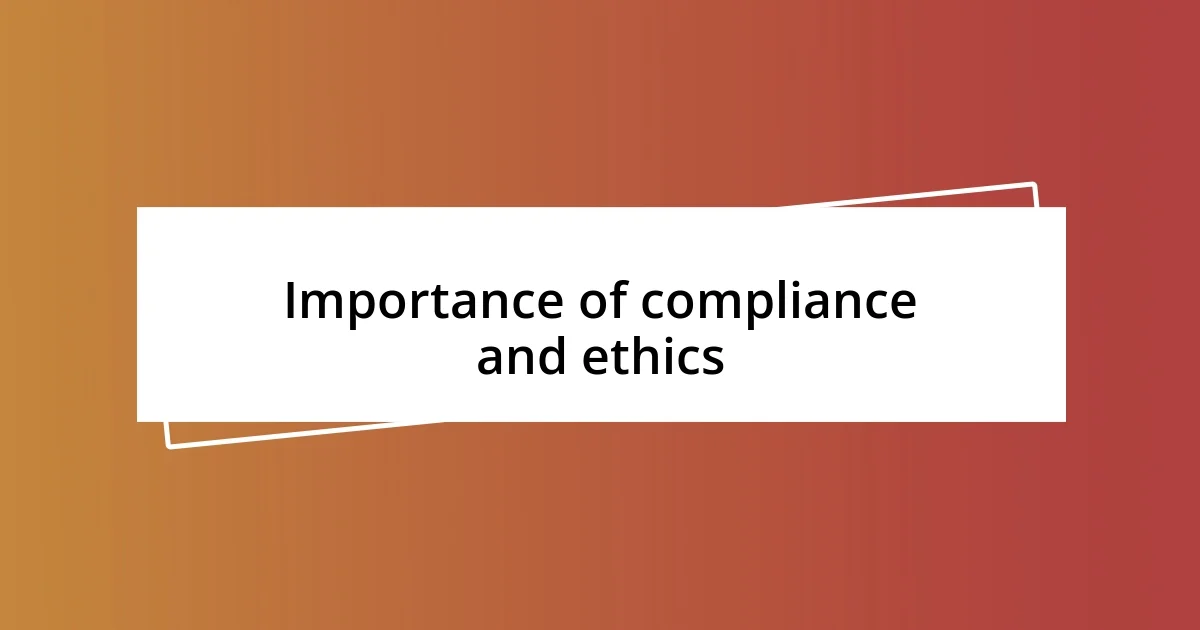Key takeaways:
- Antitrust laws, such as the Sherman Act and Clayton Act, are essential for fostering fair competition and preventing monopolistic practices, impacting everyday consumer choices.
- Common antitrust issues include price-fixing, market allocation, and problematic mergers, which can lead to decreased competition and higher prices for consumers.
- Understanding compliance and ethical practices fosters trust and sustainable growth in organizations while being informed about antitrust issues enables consumers to advocate for fairness in the market.

Understanding antitrust basics
Antitrust laws are designed to promote fair competition and prevent monopolies, which is crucial for keeping markets vibrant and dynamic. I remember when I first grasped this concept; it clicked when I realized how these laws affect everything from the price of my morning coffee to the availability of innovative tech products. Have you ever wondered why certain competitors seem to vanish overnight? That’s often due to antitrust issues coming into play.
One fundamental aspect of antitrust is the distinction between legal competition and anti-competitive behavior. For instance, companies that collude to fix prices or divide markets are engaging in practices that harm consumers. I often find myself thinking about how this leads to consumers paying more for less choice—remember when certain tech giants were scrutinized for stifling smaller competitors? The tension between competition and monopoly can deeply impact everyday life, and it’s essential to stay informed.
Learning about antitrust isn’t just an academic exercise; it has real-world implications. I recall attending a seminar where we discussed landmark cases that shaped these laws, and the room buzzed with energy as some participants expressed their frustrations over pricing strategies. Have you ever felt frustrated at how quickly prices rise following a merger? Understanding the basics of antitrust can empower us as consumers to advocate for fair practices.

Key antitrust laws explained
The landscape of antitrust laws is both intricate and fascinating. One law that often stands out is the Sherman Act, enacted in 1890, which outlaws monopolistic behaviors and sets the foundation for federal antitrust enforcement. My initial understanding of the Sherman Act hit home when I learned about how it led to the breakup of Standard Oil—not just a story from history books, but a clear example of how the law can reshape entire industries.
Here are a few key antitrust laws that form the backbone of these regulations:
- Sherman Antitrust Act (1890): Prohibits monopolization and conspiracies in restraint of trade.
- Clayton Antitrust Act (1914): Addresses specific practices that the Sherman Act doesn’t cover, including price discrimination and mergers that substantially lessen competition.
- Federal Trade Commission Act (1914): Established the FTC to prevent unfair competition and deceptive practices.
- Robinson-Patman Act (1936): Focuses on price discrimination in sales to protect small businesses.
Each of these laws plays a vital role in fostering a fair marketplace, but it’s easy to forget their significance until you see their impact firsthand. I once experienced the ripple effect of a merger in my community when a local grocery store was bought by a nationwide chain, and prices soon skyrocketed. It was a stark reminder of how these laws are not just legal jargon—they have real implications for our daily lives and choices as consumers.

Common antitrust issues faced
A common antitrust issue I frequently see revolves around price-fixing. It’s astonishing how a handful of companies can agree to set prices at a specific level, which ultimately cheats consumers out of fair pricing. I recall a moment when I realized just how pervasive this practice can be. I was chatting with friends about a brand of sneakers that suddenly jumped in price. It turned out there had been an investigation into the companies behind that brand for colluding to fix prices. That realization transformed my view on brand loyalty; I understood how easily our spending can be manipulated if we aren’t vigilant.
Another prevalent issue is market allocation, where competitors agree to divide up markets to avoid competing for customers. This practice is not just sneaky; it directly impacts consumer choice. I remember when my favorite local café went out of business, and I learned it wasn’t just about poor management but rather how larger chains had strategically divided districts amongst themselves. It left a sour taste in my mouth knowing that I was deprived of choices due to behind-the-scenes agreements.
Lastly, there’s the challenge of mergers and acquisitions which often raises eyebrows among consumers and regulators alike. While some mergers can create efficiencies, others can lead to less competition and higher prices. When I heard about a merger between two major airlines that many believed would limit flight options and elevate fares, I was frustrated. Witnessing these changes first-hand made me reflect on how vital antitrust scrutiny is for protecting consumer interests in a market that can feel increasingly monopolized.
| Common Antitrust Issues | Description |
|---|---|
| Price Fixing | Agreement among competitors to set prices at a certain level, harming consumer interests. |
| Market Allocation | Competitors agree to divide markets, reducing competition and consumer choice. |
| Mergers and Acquisitions | Consolidation of companies that can reduce competition and increase prices for consumers. |

Real-world antitrust case studies
When I think about real-world antitrust case studies, I can’t help but remember the Microsoft antitrust case from the late 1990s. The government accused Microsoft of maintaining its monopoly by bundling its Internet Explorer browser with Windows, which stifled competition. As I watched the trial unfold, I felt a mix of concern and intrigue. It made me wonder—how many choices are we willing to give up in the name of convenience? The implications of that case still resonate today, as it highlights how dominant players can skew the market in their favor.
Another compelling example is the recent scrutiny surrounding tech giants like Google and Facebook. These companies face investigations over potential monopolistic practices, like unfairly favoring their own services over competitors. Reflecting on this, I ask myself—what does it mean for innovation if a few players control the landscape? I remember a conversation with a friend who used a smaller search engine. It struck me how difficult it can be for such services to gain traction when the big names overshadow them. The battle for market fairness is ongoing, and it beckons us to consider the value of diversity in our digital experiences.
The case of the proposed merger between two dairy producers is another vivid example. As this merger stirred local protests, I felt the uncertainty in the air. People were worried about the potential increase in milk prices and the loss of small farms. It made me realize how antitrust issues aren’t just corporate jargon; they touch our everyday lives in profound ways. Will we stand by as corners are cut, or will we advocate for fairness in the markets we engage with? The collective voice of consumers can indeed challenge monopolistic trends, making it clear that we care about competition and choice.

Strategies for navigating antitrust concerns
Navigating antitrust concerns can feel overwhelming, but there are effective strategies to consider. I always emphasize the importance of staying informed about market dynamics and regulatory changes. Whenever I hear about a potential merger that may alter competition in a sector, I make it a point to dig deeper. Understanding the implications firsthand allows me to engage in conversations that matter.
I’ve found that creating a culture of transparency within organizations is essential. For instance, during a workshop I attended, we explored how open communications about pricing and market behaviors can prevent the suspicion of collusion. It struck me how cultivating a dialogue about ethical practices can empower employees to recognize questionable strategies before they escalate into issues.
Additionally, seeking legal counsel specialized in antitrust law can be a game-changer. I recall a friend’s small startup grappling with the fear of a larger competitor encroaching on their market space. They consulted an attorney who explained how to navigate potential pitfalls while fostering fair competition. This approach not only alleviated their concerns but also enabled them to focus on innovation rather than fear of being sidelined. Have you ever considered how proactive measures can alleviate stress in uncertain market environments? For me, these experiences underline that being prepared and informed truly makes a difference.

Importance of compliance and ethics
Compliance and ethics form the backbone of any organization committed to fair competition. I remember a time when I worked with a company that faced an ethical dilemma regarding pricing strategies. Engaging in a discussion with my colleagues about the importance of transparency made me realize that it wasn’t merely about avoiding legal trouble; it was about maintaining trust with our customers and partners. Why compromise integrity for short-term gain? Upholding ethical standards fosters a culture where everyone feels empowered to make decisions that align with not just the law, but with our shared values.
As I reflect on the role of compliance, I realize it acts as a guiding framework for navigating the complexities of antitrust issues. A mentor once shared a story about a significant merger that was initially seen as a great opportunity but later unravelled because of overlooked compliance problems. The fallout was not just financial; it shattered reputations and strained relationships with stakeholders. Have you ever thought about how much more challenging it becomes to rebuild trust after a scandal? Compliance isn’t just an obligation; it’s a commitment to doing right by all parties involved, creating a foundation for sustainable growth.
Ultimately, understanding the ethical implications of our business practices is crucial. I often think about small businesses that struggle to thrive amidst powerful competitors. A friend of mine runs a local café that competes with larger chains. Their ethical commitment to sourcing local ingredients not only differentiates them but also resonates with customers who value integrity. How can we inspire larger entities to consider the ethical landscape of their strategies? By prioritizing compliance and ethics, we’re not just protecting ourselves; we’re encouraging a marketplace that values fairness and innovation.

Resources for further antitrust education
When diving deeper into antitrust education, I’ve found that a mix of resources can be invaluable. One remarkable online platform I recommend is the Federal Trade Commission’s website, which offers a plethora of educational materials, including guides and case studies on antitrust laws. I often refer back to their examples to understand how theoretical concepts apply in real-world scenarios. Have you ever considered how helpful it is to see practical illustrations of legal doctrines in action?
Additionally, attending industry workshops and webinars has significantly broadened my understanding. I vividly remember a recent webinar where experts discussed evolving antitrust policies impacting tech giants. The interactive Q&A session not only clarified my doubts but also connected me with like-minded professionals eager to share their insights. It made me realize that surrounding myself with an engaged community amplifies learning. What kind of educational events have influenced your perspective on complex issues like antitrust?
Finally, I can’t stress enough the importance of reading books written by seasoned professionals in antitrust law. One book that struck me was The Antitrust Paradox by Robert Bork. It’s a deep dive into how antitrust laws can shape markets and competition. Let me tell you—it ignited my passion for understanding the balance of regulation and market freedom. Have you stumbled upon a book that changed the way you think about a subject? Exploring such resources not only feeds the intellect but also cultivates a richer understanding of the intricate dance between law and business practices.














